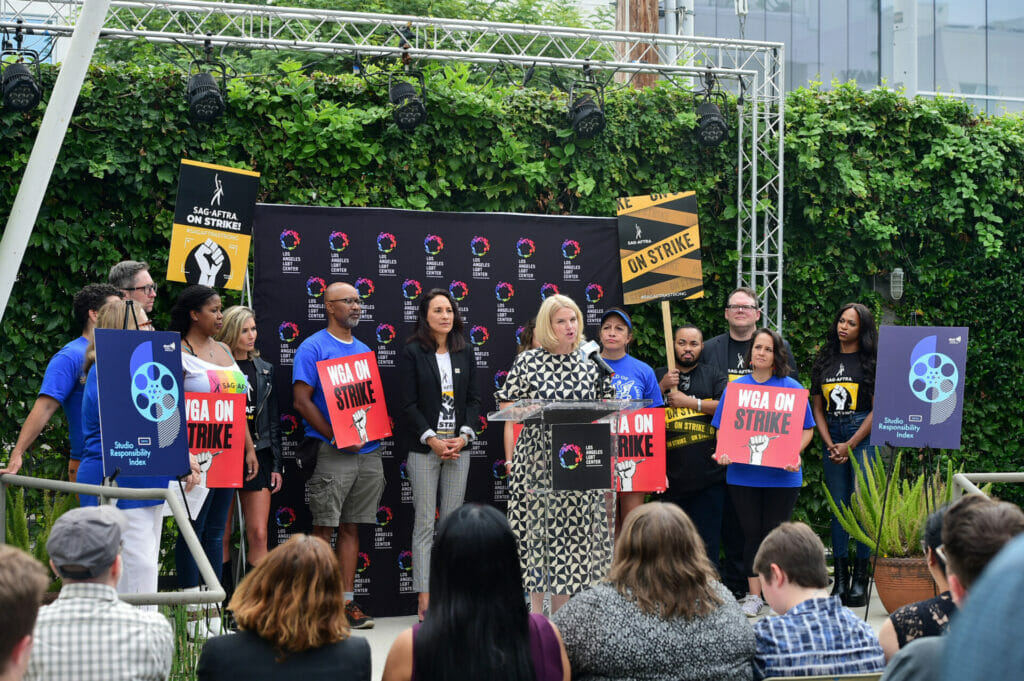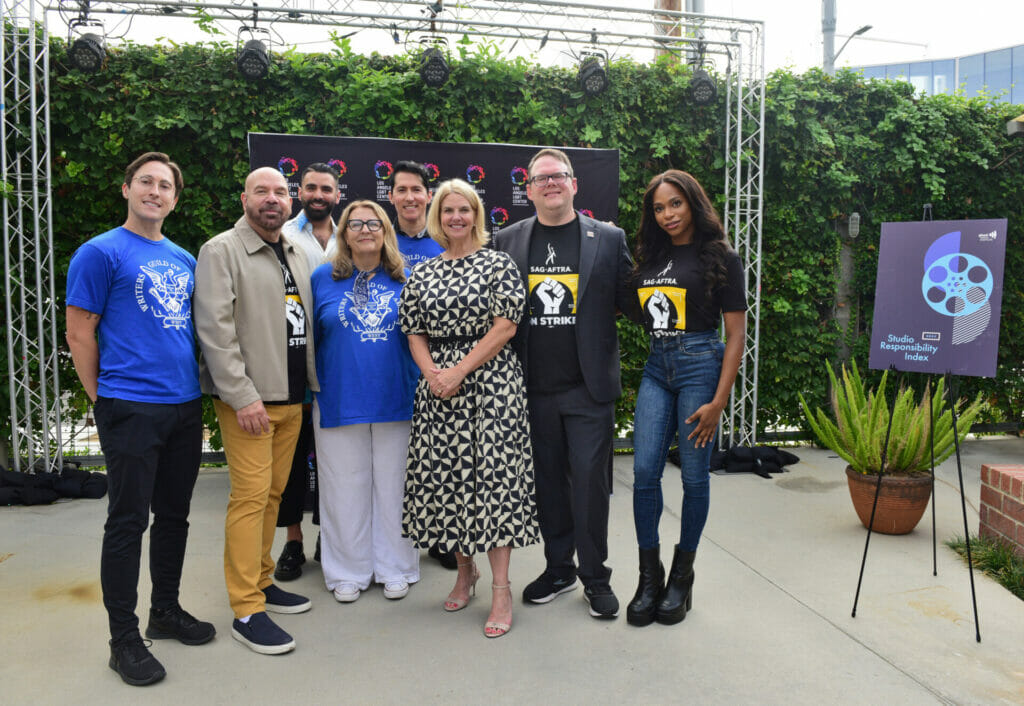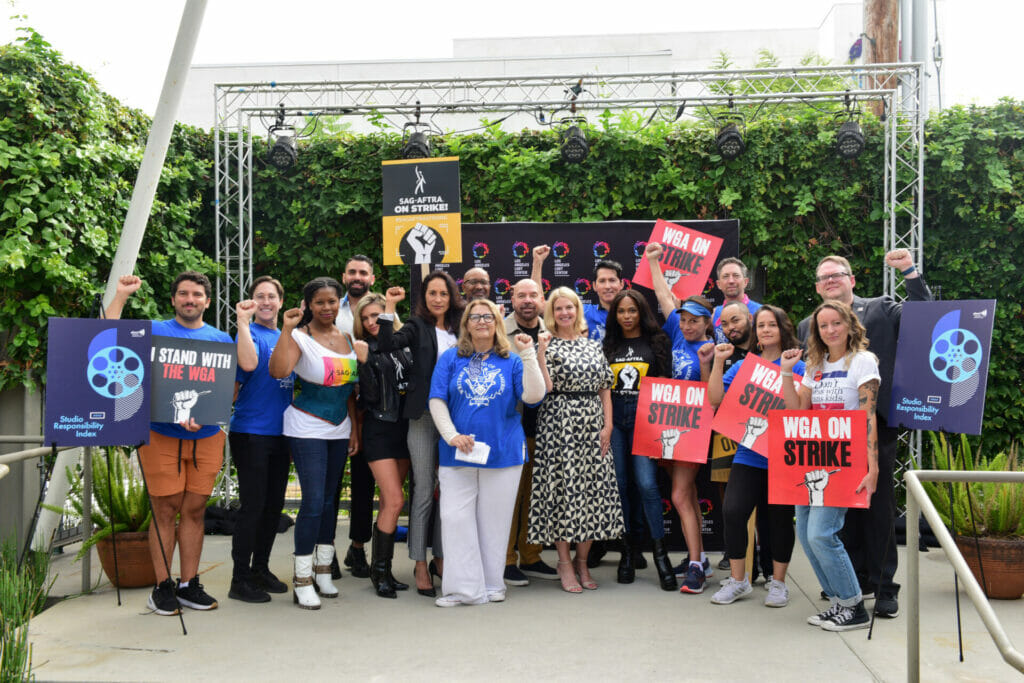Labor issues are LGBTQ issues.
Actress and proud SAG-AFTRA member Alexandra Grey did not mince words as she welcomed local and national press at a joint press conference in Hollywood this morning with GLAAD, the Screen Actors Guild – American Federation of Television and Radio Artists (SAG-AFTRA) and the Writer’s Guild of America (WGA).
The groups gathered at the Los Angeles LGBT Center to hold film studios accountable with the release of GLAAD’s 11th annual Studio Responsibility Index and call into focus the need for film studios to meet demands of writers and performers or risk losing all gains in LGBTQ representation in film.
GLAAD’s annual Studio Responsibility Index (SRI) maps the quantity, quality and diversity of LGBTQ characters in film during the previous calendar year. The study also serves as a road map for studios, identifying priorities and opportunities to increase and improve fair, accurate and inclusive LGBTQ representation and storytelling in film.
View this post on Instagram
Joining GLAAD President and CEO Sarah Kate Ellis for remarks were: SAG-AFTRA National Executive Director and Chief Negotiator Duncan Crabtree-Ireland and WGA Vice President Michele Mulroney, alongside actress and SAG-AFTRA member Alexandra Grey, actor, comedian, SAG-AFTRA member and co-chair of SAG-AFTRA’s National LGBTQ Committee Jason Stuart, Vice Chair of WGA’s LGBTQ Writers Committee JJ Wienkers-Alvendia, co-chair of WGA’s LGBTQ Writers Committee Spiro Skentzos, and Chief Marketing & Communications Officer of the Los Angeles LGBT Center Phillip Picardi and more.
In a statement, SAG-AFTRA President Fran Drescher said: “Right now there’s a very tiny but loud segment of our population that’s hard at work spreading hate and fear while attempting to squash all storytelling that showcases the full, beautiful reality of the human experience. Seeing diverse representation on screen is vital for empowering everyone to embrace their authentic selves. Sadly, the longer the AMPTP companies keep the entertainment industry shut down by refusing to come back to the bargaining table, the more risk there is for disrupting the progress that’s been made in terms of inclusive representation. Let’s make a deal and end this stalemate so we can continue sharing diverse stories and create a more hopeful, empathetic society for today’s young people.”

GLAAD President & CEO, Sarah Kate Ellis said in part: “If studios are committed to telling – and profiting from – diverse stories that audiences demand, they must also commit to the people who create and tell those stories. It is crucial that a fair deal with writers and performers is reached, that these talented creatives can return to work as soon as possible, so progress made in LGBTQ representation remains on track. LGBTQ scripted stories have a powerful and inextricable link to culture-change and lost progress in LGBTQ stories on-screen means lost progress in courthouses, classrooms and living rooms across America.
Duncan Crabtree-Ireland, the SAG-AFTRA National Executive Director and Chief Negotiator stated: “The studios’ and streamers’ insistence on keeping the industry shut down not only harms the economies of communities that rely on motion picture production, but it’s also detrimental to the pipeline of future projects that feature LGBTQ+ representation. Though some gains have been made in recent years, storytelling that reflects the full, true spectrum of the human experience is currently under attack. The AMPTP companies are complicit in this regressive push if they continue preventing artists from getting back to work and making their worldview-changing stories. Everyone deserves to grow up seeing their identity authentically represented in film and media. The companies must come back to the negotiating table, make a fair deal, get writers and performers back to work, and help all of us use the profound power of the medium — along with empowering LGBTQ+ representation — to build a better, more welcoming future for generations to come.”
WGA Vice President Michele Mulroney said in part:
“The doors of the entertainment industry began opening to LGBTQ+ writers at a time of significant downward pressure on pay and working conditions under the new streaming model. These writers, whose hearts and minds are bursting with stories they have waited too long to tell, now find themselves in jobs that don’t pay them enough to be able to sustain a career. The stalling of the AMPTP companies for the last 136 Days, and their refusal to engage in a basic negotiating process that gives writers a fair deal, threatens to impede the progress made by LGBTQ+ writers and deny our culture of powerful, authentic LGBTQ+ stories.”

The latest SRI Report includes findings such as the fact that 28.5% of films from major studio distributors included a LGBTQ character. Additionally the index found that half of LGBTQ characters had just under five minutes of screen time
While the index showed growth in representation of transgender characters, it also found that LGBTQ characters of color and people living with HIV still remain underrepresented
See GLAAD’s 2023 Studio Responsibility Index here.
See the full press release for GLAAD’s 2023 Studio Responsibility Index here.













